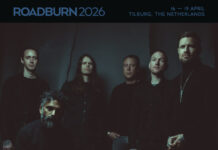Uncovering the intensity and the metal inherent in non-metal, the avant-garde and anti-traditionalist inclinations of Finland’s ORANSSI PAZUZU have always had transcendental goals at heart. The band is now releasing a brand new studio album, “Mestarin Kynsi,” released on 17 April through Nuclear Blast. We had the chance to talk to synth player Evill and bass player Ontto about the upcoming release. Read the entire interview here.

Hi there! Thanks for taking the time to do this interview. Your new album, “Mestarin Kynsi,” is going to be released on 17 April through Nuclear Blast. How are you feeling about the approaching release?
Ontto: Hi! No problem. We are very excited about the new album. It will be interesting to see how people will react to it. I think the new stuff is among our best music so far. It seems like the response has been very positive at this point. The downside is that we cannot do the album live premiere because of all this virus chaos!
The whole world is pretty shaken up at the moment and people in Finland are now recommended to stay at home. Have you been doing anything interesting to keep busy/entertained since social interactions are discouraged?
Evill: I dare to say these are globally the most exciting times I’ve seen in my lifetime. People sure are in very different places facing the whole situation. I know I’m privileged in saying this, but it’s comforting to see the whole world on hold for a short while.
Some bands have been experimenting with livestreams and Q&As; is that something ORANSSI PAZUZU is also interested in experimenting with?
Ontto: We might do something like that if it is done in a way that it feels right to us. There have been some talks about a livestream actually since we were forced to cancel some near future shows. We’ll see if we can make it work out. It sure would be nice to get to celebrate the new album a bit.
Now, before discussing the album itself, I’d like to ask you about your latest music video, “Uusi teknokratia.” Coming from an art background myself, I couldn’t help noticing you’re tapping into German Expressionism as an inspiration. What was the idea behind the video, who came up with the idea, and how were you involved in the making of?
Evill: We were familiar with some of Zev Deans’ works so we basically trusted him to feel free however he would visualize the music. At the beginning we discussed what the song is about – that paranoid feeling about powerful conspirators spying on your every thought, mind control, and all that. Zev smoothly caught the idea and pretty much took it from there. So when it comes to our involvement, we were happy to just sit tight and enjoy Zev and his crew doing their magic. For example, the whole style placing characters in a hand-drawn world and the German Expressionism, that’s all Zev. Very happy about how that came out!

I’m asking about the music video because I feel that its style is very much connected to your music. Philosopher Theodor Adorno describes expressionism as concerned with the unconscious and states that “the depiction of fear lies at the centre” of expressionist music, with dissonance predominating, so that the “harmonious, affirmative element of art is banished.” This then results in music where the dramatically increased dissonance creates, aurally, a nightmarish atmosphere. Is this somehow what ORANSSI PAZUZU is doing as well?
Ontto: That is very similar to how we think of our music. There is this dream world, the other side, whatever you call it, where the music takes your mind to. You will be looking at these visions and mirroring yourself through them. The existential threat is always there, like the abyss staring back at you. The greatest fears are inside your dissolving mind. But also our music is not completely without harmonic elements. I think that the songs have a more cathartic feeling if they have a dramatic arc and after the tension, there is also the relief. Not always, but that is something that comes naturally for us and that is something you will find in many of our songs and on every album.
When you take “Uusi teknokratia” as an example, you guys also seem to really play around with the idea of minimalism in music, you go from minimalistic atmospheric soundscapes to very layered, and detailed structures in a heartbeat. This makes me wonder what the process is behind writing the songs. I read somewhere most of your music starts by jamming; how do you add in the other elements and when do you feel a song is a finished product?
Ontto: Usually, there is an initial idea. It could be a riff, a chord change, a beat, or even just a certain sound or a mood. On “Mestarin kynsi” it was in most cases me or Jun-His who brought in these “initializations,” but then we would start working on them as an equal collective and everyone pours their distinct ideas into the song. We have five guys in the band and everyone is involved in the construction of the song. We jam the ideas a lot so that everyone can find their own way of playing the song. For example, “Uusi teknokratia” was based on this hypnorock riff and a beat that Jun-His had made a demo of, and he also penned the classical-style chord section that is kind of the climax of the song. Evill came up with all those minimalism inspired vocal and flute parts while we were jamming the song, and he also arranged the parts for the guest vocalists. I wrote riffs for the middle section and the outro. So it is pretty varied, who does what.
Evill: We also record ideas a lot, listen to them, drink beer, discuss, see if they feel psychedelic enough, haunting, aggressive, oppressive enough… whatever we are looking for in the song. The song is finished when it feels it has an identity and a dramatic arc that has an intuitive logic to it. After that comes all the mood tunings and space layers that are there to make it sink deeper into your skull and take you somewhere else.
The album is called “Mestarin Kynsi,” which translates as “The Master’s Claw.” How did you come up with its title and what does it represent to you? Is there some kind of concept present in the album, or are the lyrics in any way connected to one another?
Ontto: Yeah, I think of it as a concept album. Not only lyrically but also musically, there is a conceptual idea of entering these portals and getting mixed up in somewhat unpleasant company. “The Master” is someone rising to total power using occult mind control tricks. The first song, “Ilmestys,” visions the rise of his shadow and after that there is indoctrination going on in “Tyhjyyden sakramentti,” and so on. All the songs revolve around these ideas. I don’t want to be too literal about it because it is supposed to have some freedom of interpretation to it also, but I can say that it will end in the endless white light.
What kind of band are you, in terms of songwriters? Are you storytellers? Do you write music to change the world or spread a message? Or do you simply do it for the sake of creating music?
Evill: I think of us as psychonauts who are like-minded enough to see what’s behind that dark corner people would likely avoid. We’re also kind of believers in catharsis: Once you get in terms with whatever you might find won’t kill you, it sets you free instead. We explore feelings via making music and welcoming anyone to join the ride. In the end, we’re offering that Shakespeare-like emptiness which is hopefully followed by finding out something new about your core.
Considering you have a lot of elements of psychedelia in your music, it’s only normal that the visual aesthetics of your band also match the sound. Where do you get your inspiration from when it comes to the cover art, promo pictures, music videos, etc.? How do you find the artists you want to work with?
Evill: Whoever we work with, we’ve always found it interesting to give an artist a chance to trust whatever arises from the music itself. Let’s face it: none of the bandmembers are visual experts, so there’s only so much we know how to communicate in that area. It’s only logical that artwork and music have as pure an inspirational connection as possible without us being control freaks in the middle. Artists we work with are usually either our old friends or someone we come across in the scene. Either way, there has to be something resonating with what we do.

Hopefully, your band isn’t affected much by the global corona crisis, especially considering your tour is only planned in Autumn. Nevertheless, this is a difficult time for everyone, so how can fans best support you during these trying times?
Ontto: Yeah, it is affecting us also financially, unfortunately. Of course, we had big plans for the album release, doing all these release shows, which now are not happening. I’m still hoping that we will be able to do the release tour in September-October. In case you want to support the band, you can always buy our T-shirts or an album. We have a new webstore coming up in a few days.
Even though the future is still a bit uncertain at this time, you guys are performing at Tuska and you have a tour coming up in September. What can people expect from those shows?
Ontto: We always focus pretty heavily on the new music when we are touring, so I hope that the new album will resonate with people coming to the shows. At least you will be seeing us sweating with these new songs and the multiple synths and other stuff. We might play some older ones too, but not really sure yet how it will be. There will also be a strong visual element to the music, lights, and so on.
In general, your music is pretty atmospheric. How does that usually translate itself to the stage? Is there room for improvisations and jamming, or do you usually stick to the studio version of the songs?
Evill: Depends on a show. Sometimes there is little less time for proper jamming parts. But there are parts within the songs that we’ve intentionally left “open.” Thus there’s this authentic vibe you get when that part is reborn on the stage. It’s a beautiful thing to get to share that moment with the audience as well as with the fellow band members. Apart from that, the songs are mostly performed as they’re performed in the studio. However, the devil is in the details.
Lastly, is there anything else about the band/music you’d like to share that I didn’t ask about, or do you have any last thoughts you want to share with our readers?
Otto: Thanks for the interview.
Evill: Thank you! Be safe and enjoy the new record!





